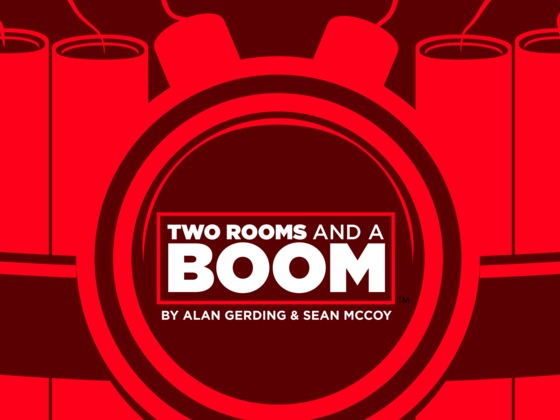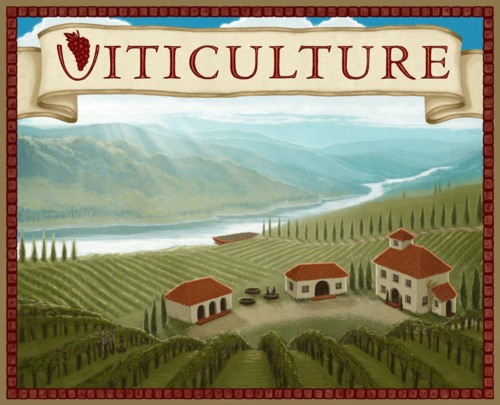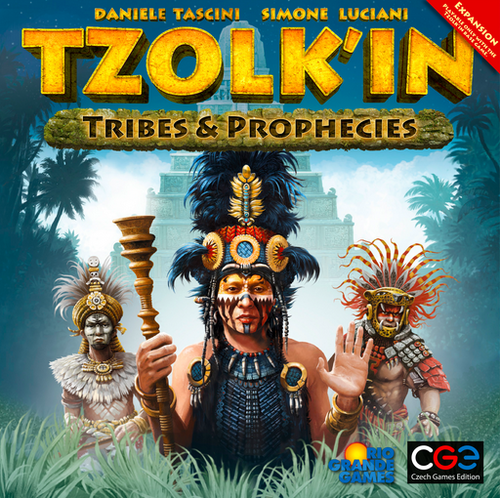 By Firestone
Confession time: I've never been a big fan of Civ games. Not board games. Not video games. Not any games. They're...boring. So Suburbia comes out, and lots of people call it a SimCity board game. This fills me with dread, and a desire to take a long nap... Could this be the first civ/city-building game I like? Or will I build a Landfill and then put this game into it? Let's find out!
By Firestone
Confession time: I've never been a big fan of Civ games. Not board games. Not video games. Not any games. They're...boring. So Suburbia comes out, and lots of people call it a SimCity board game. This fills me with dread, and a desire to take a long nap... Could this be the first civ/city-building game I like? Or will I build a Landfill and then put this game into it? Let's find out!
The Overview
You're going to be taking, paying for, and placing tiles into your city. Doing so will affect your income and population. When the game ends, whoever has the most population wins.
 The Components
The Components
1 Population board
1 Stacks board
1 Supply board
1 Real Estate board
4 Burrough boards in the player colors (black, red, purple, yellow)
144 hexagonal City tiles
20 Goal tiles
4 Player aid cards
1 Start player marker
1 Giant pile of money tokens
4 Reputation markers
4 Population markers
4 Income markers
12 Investment markers
The Setup
The City tiles are divided into four groups: Basic tiles, A, B, and C tiles. Separate the A, B, and C tiles (they have the letter on the back side), and then you'll place a number of them on the Stack board. (This number varies depending on the number of players.) In the C pile you'll also be mixing in the One More Round tile, which will trigger the end of the game.
Place money on the Supply board, and give each player $15 million. Place the basic City tiles (Suburbs, Community Park, and Heavy Factory) onto their spaces on the Real Estate Market board. Then place the top seven tiles from the A stack out onto the Real Estate Market. These spaces range in price from $10 on the top end, and free on the bottom.
Then shuffle the Goal tiles, and place a number of them out, faceup, depending on the number of players in the game. Then give each player two Goal tiles facedown, and each player chooses one to keep and places the other back in the box with out showing the other players.
Each player takes a Borough Board, places the Income marker on the 0, and the Reputation marker on the 1. Each board is flat across the top and has three "notches" for tiles to fit (see the picture). Each player takes one Suburb, one Community Park, and one Heavy Factory from the basic City tiles, and places them in that order, from top to bottom, in the middle notch of the Borough Board.
Finally, (whew!), each player grabs his or her set of three Investment markers, and places their Population square on the 2 space of the Population board. You're finally ready to play! It seems like a lot of prep, but it's intuitive, and goes fairly quickly.
 The Gameplay
The Gameplay
Randomly choose a start player. You can do one of two things on your turn: take and place a tile into your Borough, or place an Investment marker.
If you choose a tile from the Real Estate Market, you pay the cost on the tile and the cost of the tile's "position" in the Market. So as tiles are in the Market longer, they become cheaper. But, of course, the tile might be gone by the time it rolls around to your turn. So do you pay more now, or wait and hope it's still there? That's one of the interesting decision-points in the game.
You can also choose to buy one of the basic City tiles, and you just pay the cost on the tile.
Once you have a tile, you place it into your Borough. The only real restriction on placement is that the new tile has to touch at least one side of an already placed tile. Then you'll often have some adjustments to make based on the tile. So it might increase or decrease Income, or Reputation, or just give you some quick cash. You placing a tile might also trigger someone else's tile already in play. So the Homeowner's Association tile, for instance, gives its owner $2 every time any player plays a green Residential tile.
One other option for placing a tile is to make a Lake. You have to pick a tile from the Real Estate Market, and you pay the position cost only. Then you place it in your Borough, and get $2 for each adjacent tile that's not another Lake. It's a way to get some quick cash—and swipe a tile from the Market that you know someone wants.
The other option is to place one of your three Investment Markers. Instead of taking and placing a tile, you pay the tile cost of your chosen tile again, and then place a Marker on it. Now the effects of the tile are doubled for the rest of the game.
At the end of your turn you'll now receive (or pay) money, based on the position of the Income Cylinder. If you can't pay when you need to, you have to move the Population Square down one spot for each dollar you can't pay.
Now you adjust the Population Square up or down based on the position of the Reputation Cube. As your Borough and Population grow, you'll have to pay more to maintain it. There are red lines on the population track, and whenever you cross one, you reduce your Income Cylinder and Reputation Cube down one spot. If you ever end up going back below a red line (due to negative Reputation, for instance), you'll put the Income and Reputation back up one spot.
If you bought a basic City tile, or placed an Investment Marker, you must remove any tile from the Real Estate Market—paying the position cost only. So one tile will be removed from the Market on each player's turn. Now you slide all of the remaining tiles down—making them cheaper—and place a new tile on the leftmost position.
When the "1 More Round" tile comes up, you finish the current round and then play...one more round. Now you look at Goals, and then turn money into Population—you ignore the red lines from this point forward.
First you check the faceup Goal tiles, and award the points to one player. If there's a tie, no one gets any points. Now each player reveals his or her secret Goal, and scores the points if they've achieved the goal themselves. Again, if you've tied, you don't get the points, and only the owner of the secret Goal gets a chance to get those points. Finally, you'll turn money into Population at the rate of 1 point for every $5, rounded down. (Keep any leftover money, as that's the third-level tiebreaker.)
Some of the Goals include "+10 for the most airports," or "+20 for the fewest Residential tiles," or "+20 for the lowest Reputation."
Whichever player has the most Population wins. If there's a tie, it's the person with the highest Reputation, and then the highest Income, and finally most leftover money.
There's also a Solo Version, where you're playing the 2-player version against a "bot" player.
 The Verdict
The Verdict
I love this game. It hits all of the right buttons for me: It's thematic, full of interesting decisions, has an auction with more meaningful decisions, includes Goals you're working toward, and just...yeah!
Let's get this out of the way: There are a couple of things I don't like. First, with so many tile interactions going on each turn, it's easy to feel that someone at the table has missed a bonus somewhere—but that's a small complaint.
The larger issue is the Goal tiles. Those are a lot of points, and it's fairly easy for someone to unintentionally interfere with your Goal. For instance, in a recent 2-player game my opponent had a hidden Goal of "+20 for the most lakes." Unfortunately for him, I seemed to be constantly broke, so I kept buying lakes for some quick cash. So those were 20 points I "stole" from him, and I had no idea I was doing it. Even worse are tiles like "+15 for the fewest played Investor Markers." There is nothing you can do to control whether other players play their Investment Markers, so if even one person chooses not to play one, you're just out those points. It's kind of a big deal, but this is one of those games where the other parts are so good that I overlook this flaw.
Okay, now that that's out of the way, let's go back to the good stuff.
I've played this with every number of players, and it scales well. I especially like the 2-player game, because as you add players, you increase the chances of someone messing with your hidden Goals—although I do like having more people trying to win the public Goals. Okay, I like every number! I also like that it's on the lighter end of the spectrum, while still creating meaningful and interesting decisions. One reason I dislike Civ games is that there's just so much going on. This isn't a light game, but it also doesn't overwhelm you with minutia. I played with my 9-year-old, and he did just fine. It's a good next-level game for him. And though I have yet to test this, I think this would actually be a pretty good nongamer game.
The theme is really strong here, and it comes through in small touches. For instance, if you build a Landfill, you'll increase your Income, but for every building you build it next to, your Reputation will decrease. And every single tile has these thematic touches that make sense and make the game fun and interesting. And because you're not using every tile in every game—and there are different Goals in every game—no two games will feel the same.
I like laying tiles. This might be because one of my first Euros was Carcassonne, but I just like laying tiles, and deciding where the best place to put a tile is. But it's not just laying tiles, because there's also that wonderful Market. "That's a great tile, but it's expensive. Will it still be there when it gets to my turn again—and when it's cheaper?" "Should I turn that tile into a lake to keep it away from her?" Every turn has these sorts of decisions to make, and I enjoy doing that.
Another good thing? Combos!!
The game plays quickly, even with the full complement of players. And a 2-player game can be played in 30-45 minutes, so it's really a meaty filler. I love that.
The Final Verdict
I know I seem to be gushing over this, but I'm completely taken with it. I LIKE playing this game. There are a lot of great games that I wouldn't personally say are "fun" (Dominion springs to mind), but this one is fun for me. It's hasn't even come close to getting old, and I don't think I'd ever turn down a game. Bezier Games just came out with a expansion, and I can't wait to see what they do to expand this. It's one of my favorite games I played this year. Put this on the table!!
Theology Of Games would like to thank Bezier Games for providing a review copy of Suburbia. This in no way affected our opinion of the game.
Thanks for reading! Have you played Suburbia? Did you agree with my review, or do you think I should build a lake and then jump in it...? Let us know in the comments.












































